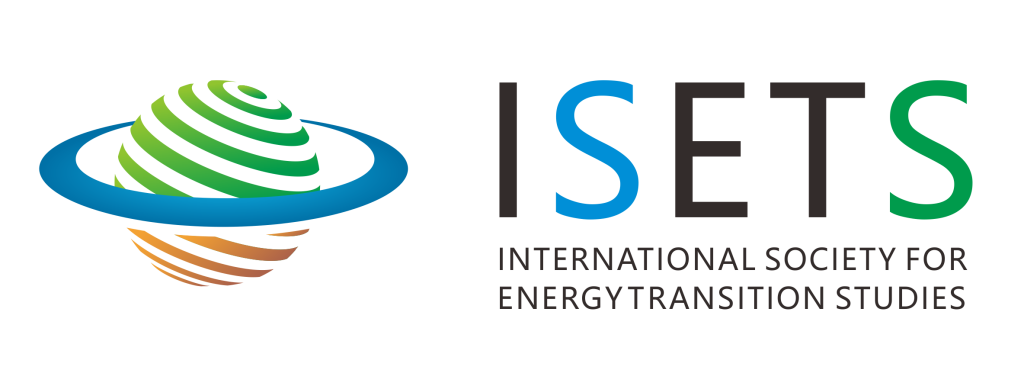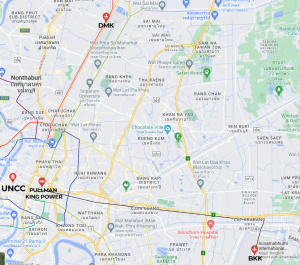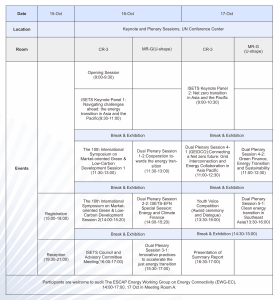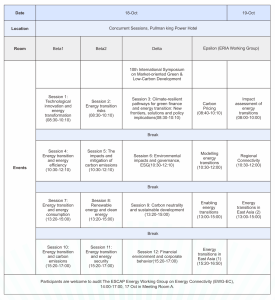Inaugural ISETS International Conference
“ENERGY TRANSITION AMID UNPRECEDENTED CHANGES”
15-19 October 2023
Bangkok, Thailand
The International Society for Energy Transition Studies (ISETS) is organizing the Inaugural ISETS International Conference on October 15-19, 2023, in Bangkok. The main theme of the conference is ‘Energy Transition Amid Unprecedented Changes’. The conference will address a broad spectrum of energy, climate change, and other environmental topics. Its goal is to support the attainment of just and equitable energy transitions by fostering exchanges and dialogues among academics, analysts, policy makers, and industry participants.
The conference plenary sessions, tentatively named the Global Energy Transition Dialogue, including the opening and ministers’ sessions, will be held at the United Nations Conference Center on October 16th and 17th, 2023. It is co-organized with the United Nations Economic and Social Commission for Asia and the Pacific (ESCAP), in partnership with several renowned institutes from around the world. These plenary sessions are open to the public free of charge. The plenary sessions will be important components of the Asia Pacific Energy Week, along with the Third Asian and Pacific (Ministerial) Energy Forum (APEF3) on October 18th-20th, 2023. The key findings and recommendations from the Plenary Sessions will contribute to APEF3. (For details, please refer to https://www.unescap.org/events/2023/APEF3).
The concurrent sessions will be held in a venue to be announced. Submissions to concurrent sessions are open until 31 May 2023. Papers submitted to the conference have the opportunity to publish in one of the six special issues in journals such as Energy Economics, Utilities Policy and Applied Energy.
The keynote speakers of this conference will include several energy ministers, international organization leaders, renowned entrepreneurs, and scholars, as well as multiple well-known figures from various fields such as politics, industry, and academia. These speakers include Mr. Suwit Kjunkitti, former Deputy Prime Minister and Minister of Education of Thailand (the Chair of ISETS Advisory Committee), Professor Aoife Foley from the University of Manchester (Editor-in-Chief of the journal Renewable and Sustainable Energy Review), Dr. Bruce A. McCarl from Texas A&M, Mr. Xiansheng Sun, former Secretary-General of the International Energy Forum (the Council Chairman of ISETS), Mr. Weerawat Chantanakome, from the Ministry of Energy of Thailand (the Councilor of ISETS), and Mr. Yongping Zhai, Special Advisor of Carbon Neutrality of Tencent (former Chief Energy Specialist at the Asian Development Bank and council member of ISETS).
Call for papers:
Papers to be considered include but are not limited to the following list of topics:
- Energy transition economics, policy and finance
- Modelling and pathways to carbon neutrality
- Energy, carbon, electricity and stock markets
- Energy security, risks and economy
- Finance and investment
- Energy pricing and market dynamics
- Environmental impacts and governance, ESG
- Social impacts and management
- Innovation, Research & Demonstration
Call for sessions:
The first ISETS International Conference is open for application for the “Plenary/ Concurrent Sessions”. Each concurrent session is about 100 minutes, which should consist of at least 4 paper presentations. For that session, the organizer or his team can present 2 papers at most. The Session organizers will be responsible for advertising the workshop, selecting, and reviewing the final report papers. The Session organizers will be granted one complimentary conference registration for the Inaugurate ISETS International Conference. Following the end of the Conference, the papers presented at the Sessions will be considered for publication in the special issues.
Please send your proposal to events@isets.org; dzhang@swufe.edu.cn.
Proposals to organize Sessions should include the following information:
- The title of the Session
- The name, affiliation, mailing address and e-mail address(es) of the proposer(s)
- A description of the topic of the Session (not exceeding 100 words)
- A short description on the means of advertisement for the Session
- Paper title and authors
The Call For Abstracts can be downloaded at: Inaugrual Annual Conference CfP final 0519
Co-Organizers:
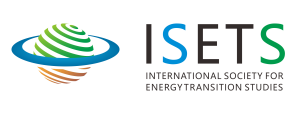
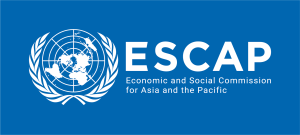
Principal Conference Partner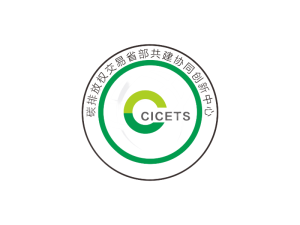
Collaborative Innovation Center for Emissions Trading System Co-constructed by the Province and Ministry, China
Knowledge Partner:
 Economic Research Institute for ASEAN and East Asia (ERIA), Indonesia
Economic Research Institute for ASEAN and East Asia (ERIA), Indonesia
Event Management:
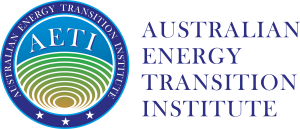
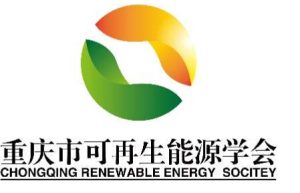
Event Manager Event Managment Parter
Media Collaborators

Media Partner

Media Supporter
Honorary Conference Chairs
H.E. Dr. Suwit Khunkitti, Chairperson of the ISETS Advisory Committee
Professor Xiansheng Sun, Chairperson of the ISETS Council
Co-Chairs
Professor Xunpeng Shi, Research Principal, Australia-China Relations Institute, UTS& President, ISETS
Dr Michael Williamson, Section Chief, Energy Division, ESCAP
Scientific Committee
Chair: Dayong Zhang, Southwestern University of Finance and Economics; ISETS Vice President
Co-Chairs:
Dr. Weerawat Chantanakome, Ministry Councilor for International Affairs, Ministry of Energy, Thailand; Member of ISETS Advisory Committee
Professor Farhad Taghizadeh-Hesary, Tokai University; ISETS Vice President
Members:
Professor Jun Arima, University of Tokyo
Professor Fukunari Kimura, Keio University
Mr Shigeru Kimura, ERIA
Associate Professor James Cheong, Hang Seng University of Hong Kong
Professor Llewelyn Hughes, Australian National University
Professor Qiang Ji, Chinese Academy of Sciences
Professor Tatiana Mitrova, Columbia University
Dr Victor Nian, Centre for Strategic Energy and Resources (CSER)
Dr Jinho Park, Korea Energy Economics Institute (KEEI)
Dr Maxensius Tri Sambodo, Indonesian Institute of Sciences
Professor Vinod Sharma, Indira Gandhi Institute of Development Research (IGIDR)
Dr Yongping Zhai, Asian Development Bank (ADB)
Program Committee
Chair: Qiang Ji, Chinese Academy of Sciences; ISETS Vice President
Co-Chairs: Phoumin Han, ERIA; ISETS Council Member
Organising Committee
Co-Chairs:
Dr. Muyi Yang, Asia Society Policy Institute; ISETS Deputy Secretary
Yongping Sun, Huazhong University of Science and Technology; ISETS Vice President
Professor Shabbir Gheewala, The Joint Graduate School of Energy and Environment (JGSEE), King Mongkut’s University of Technology Thonburi
Coordinators
Professor Chin-Hsien Yu, Southwestern University of Finance and Economics
Professor Keying Wang, Hubei University of Economics
Mr Eddy Siyu Ma, Chongqing Renewable Energy Society
Members
Dr Yifan Shen, Tongji University
Plenary Sessions
The annual conference plenary sessions, including the opening and ministers’ sessions, will be held at the United Nations Conference Center on October 16th and 17th, 2023. It is co-organized with the United Nations Economic and Social Commission for Asia and the Pacific (ESCAP), in partnership with several renowned institutes from around the world.
These plenary sessions are open to the public free of charge. The plenary sessions will be important components of the Asia Pacific Energy Week, along with the Third Asian and Pacific (Ministerial) Energy Forum (APEF3) on October 18th-20th, 2023. The key findings and recommendations from the Plenary Sessions will contribute to APEF3.
(For details, please refer to https://www.unescap.org/events/2023/APEF3 ).
Ministers and Senior Officials
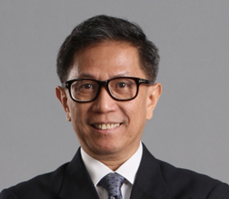
Raphael P.M. Lotilla
Secretary, Department of Energy, The PhilippinesSecretary Raphael P.M. Lotilla has served in government for more than 20 years in various capacities — professor of law in the University of the Philippines (UP), Undersecretary at the National Economic and Development Authority (NEDA) under three Presidents, President and CEO of PSALM, besides sharing his expertise as legal consultant to several Senate Presidents and Senators. He is currently in his second stint as Secretary of Energy. He also served as Regional Programme Director of a regional seas project funded by the Global Environment Facility (GEF) and implemented by the United Nations Development Programme (UNDP).
In the private sector, he was an independent director in several publicly listed conglomerates with diverse interests, including energy and financial services.
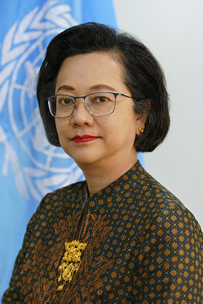
Armida Salsiah Alisjahbana
ESCAP Executive SecretaryMs. Armida Salsiah Alisjahbana was appointed Under-Secretary-General of the United Nations and Executive Secretary of the Economic and Social Commission for Asia and the Pacific (ESCAP) on 13 September 2018.
Prior to joining ESCAP, Ms. Alisjahbana was Professor of Economics at Universitas Padjadjaran in Bandung, Indonesia, a position she assumed in 2005. She joined Universitas Padjadjaran as a lecturer in 1988. Since 2016, she has served as Director for the Center for Sustainable Development Goals Studies at Universitas Padjadjaran and Vice Chair of the Indonesian Academy of Sciences.
She also serves on the Governing Board of the Economic Research Institute for ASEAN and East Asia (ERIA), and member of the Indonesian Academy of Sciences (Akademi Ilmu Pengetahuan Indonesia – AIPI), the Forum of Statistics Community (Forum Masyarakat Statistik or Advisory Council of the Indonesian Statistics), the International Advisory Board of the Bulletin of Indonesian Economic Studies and Council Member of the Regional Science Association International (RSAI).
From 2009 to 2014, she was Minister of National Development Planning and the Head of the National Development Planning Agency (BAPPENAS), Indonesia. She served as Co-chair of the Global Partnership for Effective Development Cooperation from 2012 to 2014. From 2009 to 2014, she was Alternate Governor of the World Bank and Alternate Governor of the Asian Development Bank representing the government of Indonesia. In 2016, she was a member of the High Level Independent Team of Advisors to support the ECOSOC Dialogue on the longer term positioning of the United Nations Development System in the context of the 2030 Agenda on Sustainable Development.
Ms. Alisjahbana has been involved in various research projects and consultancies to the United Nations University/Institute for Advanced Study in Tokyo, the World Bank, the Asian Development Bank (ADB), the Department of Foreign Affairs and Trade (DFAT), Australia, the Australian Agency for International Development (AusAID), the European Commission, and the International Labor Organization (ILO).
Ms. Alisjahbana earned her Bachelor degree in Economics and Development Studies from Universitas Indonesia, Indonesia, a Masters degree in Economics from Northwestern University, USA and a Ph.D in Economics from University of Washington, USA. She was awarded the Mahaputra Adipradana Order (Bintang Mahaputra Adipradana) from the Republic of Indonesia, honorary brevet from the Indonesian Navy and honorary flight wing from the Indonesian Air Force.
Other Featured Keynote and Plenary Panellists
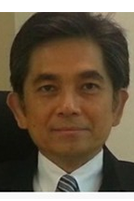
Weerawat Chantanakome
Ministry of Energy, ThailandDr. Weerawat Chantanakome is the Ministry Counselor for International Affairs at Thailand’s Ministry of Energy. Previously, he served as Chief Executive Officer (CEO) of the Brunei National Energy Research Institute (BNERI) and as Senior Team Leader at the Asia-Pacific Energy Research Centre (APERC). From 2004 to 2009, he was the Executive Director of the ASEAN Centre for Energy (ACE). With over 25 years of experience, Dr. Weerawat has led multi-disciplinary energy projects with major organisations such as the United Nations, World Bank, Asian Development Bank (ADB), International Energy Agency (IEA), and International Renewable Energy Agency (IRENA).
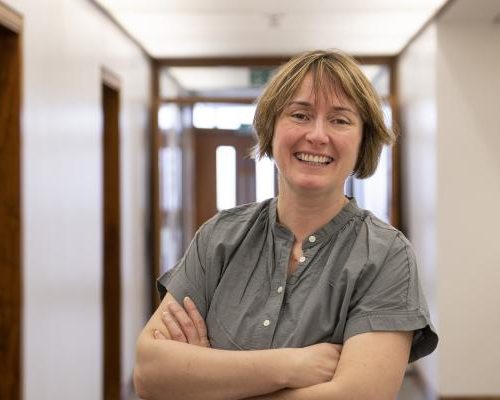
Aoife Foley
University of Manchester, UKAoife M. Foley is Chair in Net Zero, The University of Manchester & Professor in Energy Systems Engineering, Queen’s University Belfast. She is also Editor in Chief, Elsevier Renewable and Sustainable Energy Reviews. Aoife received the B.E. degree in civil engineering and the Ph.D. degree in unit commitment modeling of wind and energy storage in the Irish power system from the University College Cork, Cork, Ireland, in 1996 and 2011, respectively, and the M.Sc. degree in transportation engineering from Trinity College, Dublin, Ireland, in 1999. She is a Reader with the School of Mechanical and Aerospace Engineering, Queen’s University Belfast, Belfast, U.K. She worked in the industry for 12 years for ESB International, Siemens, SWS Energy and PM Group, mostly in the planning, design, and project management of energy, telecoms, waste and pharma projects. Her research interests include energy systems modelling focused on electricity systems, markets and services, wind power, electric vehicles, and smart technologies.,Dr. Foley is the Editor in Chief of Renewable and Sustainable Energy Reviews. She was a founding member of the IEEE VTS U.K. and Ireland Chapter in 2011. She is a Chartered Engineer (2001), a Fellow of Engineers Ireland (2012), and a member of the IEEE PES and VTS.

Suwit Khunkitti
former Deputy Prime Minister and Minister of Education, ThailandH.E. Dr. Suwit Kjunkitti is the Chair of the ISETS Advisory Committee, Vice Chairperson, Board of Trustees, Asian Institute of Technology and former Deputy Prime Minister and Minister of Education of Thailand. Dr. Suwit has an extensive base of experience and achievement spanning government, business, and social enterprises. Between 1983 and 2011 he served as a Member of Parliament and of The Government of Thailand. Over this period, his portfolios included: Deputy Prime Minister (6 times); Minister for Justice; Minister for Agriculture and Cooperatives; Minister for Science, Technology and Environment; Minister for Natural Resources and Environment; Minister for Information and Communication Technology; Minister for Education; Ministry for Industry; Deputy Secretary General to the Prime Minister; Parliamentary Secretary of Ministry of Commerce, University Affairs & Foreign Affairs; Chair of the House of Representatives Standing Committee on Women & Youth Affairs. He has also served as Chairman of various National Committees including the National Committee on Environment, the National Water Resources Committee, the National Research Council, the National Science and Technology Development Council, the National Education Council, the National Information Communication Technology Committee, and the Thailand Board of Investment. Between 1999 and 2000, Dr Khunkitti was the Chairman of Thailand’s Social Action Party.
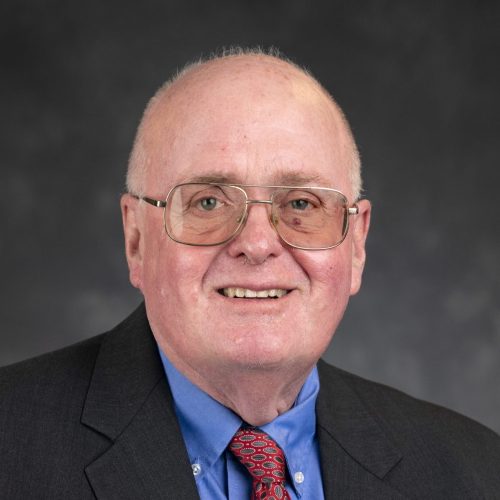
Bruce A. McCarl
Texas A&M, USADr. McCarl received his B.S. in Business Statistics from the University of Colorado and his Ph.D. in Management Science from the Pennsylvania State University. He joined the Agricultural Economics faculty at Purdue University in 1973, moved to Oregon State University in 1982 and then on to Texas A&M in 1985. He is the author of over three hundred scientific articles in internationally renowned peer-reviewed journals, including, Nature, Science, Nature Climate Change and Nature Communications. Based on Google Scholar, his work has been cited over 33,000 times. He is a fellow of three Agricultural Economics Associations, the 2022 SEC Professor of the Year from Texas A&M and was part of the group awarded the 2007 Nobel Peace Prize. His specialties include economics of climate change, water, agricultural policy and optimization theory.
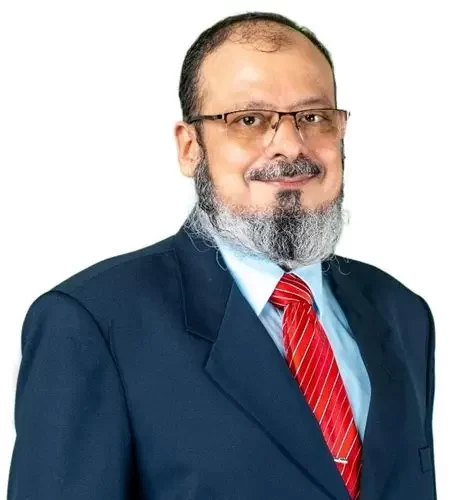
Shabbir H. Gheewala
Joint Graduate School of Energy and Environment (JGSEE),ThailandShabbir H. Gheewala is a professor at the Joint Graduate School of Energy and Environment (JGSEE), Thailand where he teaches Life Cycle Assessment and has led the Life Cycle Sustainability Assessment Lab for almost 25 years. His research focuses on sustainability assessment of energy systems; sustainability indicators; circular economy; and certification issues in biofuels and the agro-industry. He is a national expert on life cycle inventory as well as product carbon and water footprinting in Thailand. He mentors the research network on sustainability assessment and policy for food, fuel and climate change in Thailand.
With over 350 papers in peer reviewed journals, he is the Specialty Chief Editor of Quantitative Sustainability Assessment at Frontiers in Sustainability, and on the editorial boards of Sustainable Production and Consumption (Elsevier), Energy Nexus (Elsevier), International Journal of Life Cycle Assessment (Springer), and a host of other journals.
Along with graduate teaching and research, Shabbir has worked extensively with industry in Thailand providing training and consultancy to scores of companies with aspirations towards improvements in sustainability. He also sits on several national committees providing technical support to policy-making bodies in Thailand. He has conducted national projects on sustainability and competitiveness for several critical supply chains in Thailand with the support of agencies such as the National Science and Technology Development Agency (Ministry of Science and Technology), Agricultural Research and Development Agency, Department of Alternative Energy Development and Efficiency (Ministry of Energy) and the National Research Council of Thailand.
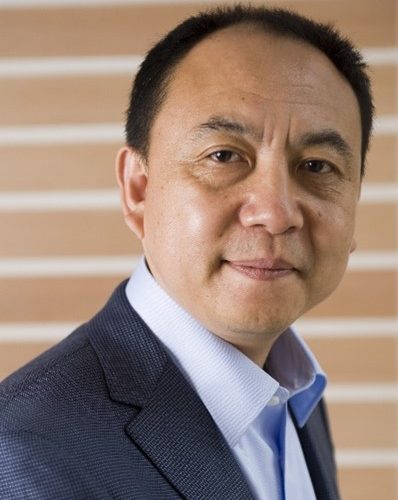
Ye QI (齐晔)
Hong Kong University of Science and Technology (Guangzhou)Professor Ye Qi is the Acting Dean of the Society Hub at the Hong Kong University of Science and Technology (Guangzhou) where he founded the Thrust of Carbon Neutrality and Climate Change, and the Thrust of Innovation, Policy and Entrepreneurship. Before joining HKUST, he was Cheung Kong Professor at Tsinghua University’s School of Public Policy and Management, and the Volkswagen Chair Professor of Sustainability at Schwarzman College, Director of Climate Policy Initiative. Between 2014 and 2019, he was Senior Fellow at the Brookings Institution and the Director of the Brookings-Tsinghua Center for Public Policy. He taught ecosystem management and climate change science at the Department of Environmental Science, Policy and Management at the University of California, Berkeley from 1996 to 2003, and was a faculty scientist at Cornell University’s Engineering and Theory Centre from 1995 to 1996. He received a Ph.D. in Environmental Science in 1994, jointly awarded by the State University of New York College of Environmental Science and Forestry and Syracuse University. He conducted post-doctoral research under Charles D. Keeling at the Scripps Institution of Oceanography, UC San Diego. He published more than 200 journal papers and academic books on policy and governance of energy, environment and climate change.
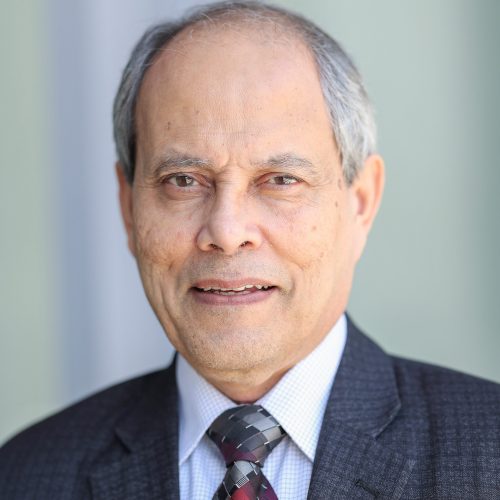
Saifur RAHMAN
Advanced Research Institute at Virginia Tech, USA & 2023 IEEE President & CEOProfessor Saifur Rahman is the founding director of the Advanced Research Institute at Virginia Tech, USA where he is the Joseph R. Loring professor of electrical and computer engineering. He also directs the Center for Energy and the Global Environment. He is a Life Fellow of the IEEE and an IEEE Millennium Medal winner. He is the 2023 IEEE President and CEO and was the president of the IEEE Power and Energy Society (PES) for 2018 and 2019. He is the founding editor-in-chief of the IEEE Electrification Magazine and the IEEE Transactions on Sustainable Energy. He has published over 150 journal papers and has made over five hundred conference and invited presentations. He was the chair of the US National Science Foundation Advisory Committee on International Science and Engineering. He has conducted several energy efficiency, renewable energy, blockchain and sensor integration research projects for Duke Energy (USA), Tokyo Electric Power Company, the US National Science Foundation, the US Department of Defense, the US Department of Energy and the State of Virginia. He has a PhD in electrical engineering from Virginia Tech.
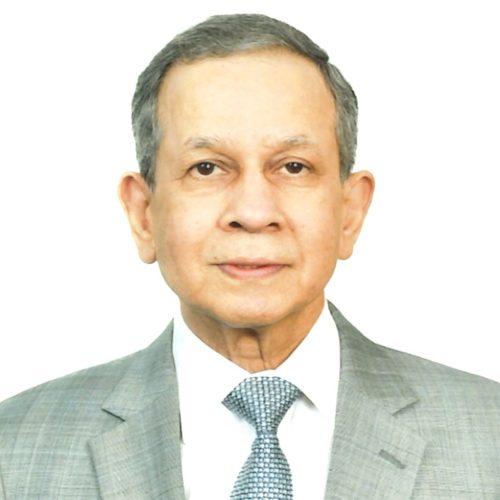
Deepak Sharma
Asian Institute of Technology (AIT), ThailandProfessor Deepak Sharma is currently the Director of the Centre for Global Challenges, at the Asian Institute of Technology (AIT). Prior to this, he was the Vice President for Academic Affairs of AIT (2019-2021), and the Director of the Centre for Energy Policy (CEP)/ Energy Planning and Policy Program at the University of Technology Sydney (UTS) (1991- 2019). He is also an Emeritus Professor at UTS, and the current Board Chair of ProSPER.Net (United Nations University). His teaching, research, and consulting interests include energy market reforms and energy transition; infrastructure regulation; energy-water-food security; energy-economy interactions; environmental policy; institutions and governance; technology-policy interfaces; and political economy.
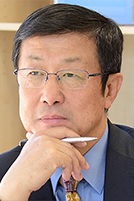
Xiansheng Sun (孙贤胜)
Chairman, ISETS Council; Former Secretary-General, International Energy Forum (IEF)Dr. Xiansheng Sun is the Chairman of the International Society for Energy Transition Studies (ISETS) and previously served as the fourth Secretary-General of the International Energy Forum. He has extensive experience with the China National Petroleum Corporation (CNPC), where he played a pivotal role in negotiating and signing numerous collaborative contracts for projects both domestically and internationally. Additionally, Dr. Sun served as President of the CNPC Research Institute of Economics and Technology (RIET), the corporation’s think tank, until the end of 2015.
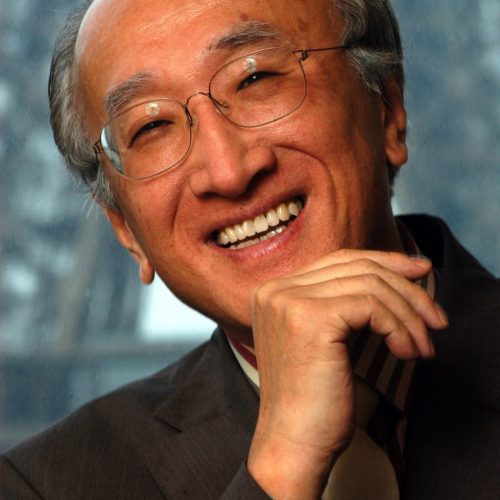
Nobuo Tanaka
Co-Chair, ISETS Council; Executive Director Emeritus, International Energy Agency (IEA)Nobuo Tanaka is the Executive Director Emeritus of the International Energy Agency (IEA) and currently serves as Chairman of the steering committee for the Innovation for Cool Earth Forum (ICEF). As IEA’s Executive Director (2007-2011), he led the collective release of oil stocks in 2011. Beginning his career in 1973 at Japan’s Ministry of Economy, Trade, and Industry (METI), he held key roles, including Director-General of the Multilateral Trade System Department. As Minister for Industry, Trade, and Energy at Japan’s Embassy in Washington DC, he addressed major US-Japan trade issues. He also twice served as Director for Science, Technology, and Industry at the OECD in Paris. Now CEO of Tanaka Global Inc, he advises Japanese and international companies.
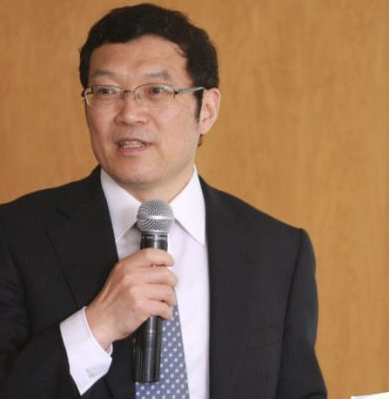
Jinjun Xue
Nagoya University, JapanDr. Jinjun Xue is a Professor at Economic Research Centre of Economics of Nagoya University, Japan. He held careers of Fulbright Scholar at Economic Growth Centre of Yale University in USA, Professor and Deputy Dean of Economics School of Wuhan University, Associate Professor of Hitotsubashi University and Professor of Oita University), Japan, visiting Professor at University of Oxford etc. He is also a visiting Researcher at Tsinghua University, Chinese Academy of Sciences, Wuhan University and so on.
His major is Development Economics and the current research subjects are Global Income Inequality, Labour Migration, Global Value Chains and CO2 Emissions and the Chinese Economy; He published many books in English, Japanese and Chinese, and papers in Science, Nature Communications, Applied Energy, Energy Economics, China Economic Review etc. Currently he serves as a guest editor of Applied Energy, Singapore Economic Review and reviewers of many international journals.
Xue Jinjun is the author of China’s first textbook of Development Economics, the author of the first book entitled Low Carbon Economics, one of the founders and co-director of the first research institute named after the “low carbon economy”, one of the initiative members of Beijing Humboldt Forum.
He is one of the first scholars who advocated China’s implementation of export-driven economic growth, proposed a low-carbon development model, and actively participated in China’s low-carbon city design and carbon market construction. He also has many publications on labor migration and income distribution China.
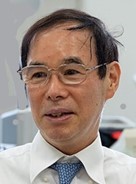
Naoyuki Yoshino
Keio University, JapanDr. Naoyuki Yoshino is Professor Emeritus at Keio University, Tokyo, Japan. From 2014 to 2020, he was Dean & CEO of the Asian Development Bank Institute (ADBI). He obtained his Ph.D. from Johns Hopkins University (United States) where his thesis supervisor was Sir Alan Walters, economic adviser to former British Prime Minister Margaret Thatcher. Dr. Yoshino has been a visiting scholar at the MIT (United States) and a visiting professor at various universities including the University of New South Wales (Australia), Fondation Nationale des Sciences Politiques (France), the University of Gothenburg (Sweden) and Martin Luther University of Halle-Wittenberg (Germany). He has also been an assistant professor at the State University of New York at Buffalo (1979-1981), an associate Professor at GRIPS (National Graduate Institute for Policy Studies, 1982-1990) and an economics professor at Keio University (1991-2014). Dr. Yoshino’s professional career includes membership in numerous government committees. He was named Director of the Japan Financial Services Agency’s (FSA) Financial Research Center (FSA Institute) in 2020. He was appointed as Chair of the Financial Planning Standards Board in 2007. He served as Chairperson of the Japanese Ministry of Finance’s Council on Foreign Exchange as well as its Fiscal System Council (Fiscal Investment and Loan Program Section). Additionally, he was a Board Member of the Deposit Insurance Corporation of Japan and President of the Financial System Council of the Government of Japan. He was nominated for inclusion in Who’s Who in the World for 2009, 2013, and 2020. He was awarded honorary doctorates from the University of Gothenburg (Sweden) in 2004, Martin Luther University of Halle-Wittenberg (Germany) in 2013 and received the Fukuzawa Award in 2013 for his contribution to research on economic policy. He served as the T20 Japan, Lead-chair during Japan’s Presidency of the G20-2019 meeting and the Lead Co-chair of the T20 Infrastructure Financing Task Force. He handed over T20 presidency of Japan to Saudi Arabia’s presidency in 2020 and Italy’s Presidency in 2021. He received the International Green Finance Lifetime Achievement Scientific Award from the Central Bank of Hungary which was held at the Planet Budapest 2021 sustainability EXPO summit. He is a member of Economic Advisory Group (EAG) of Republic of Palau in 2022-2024.
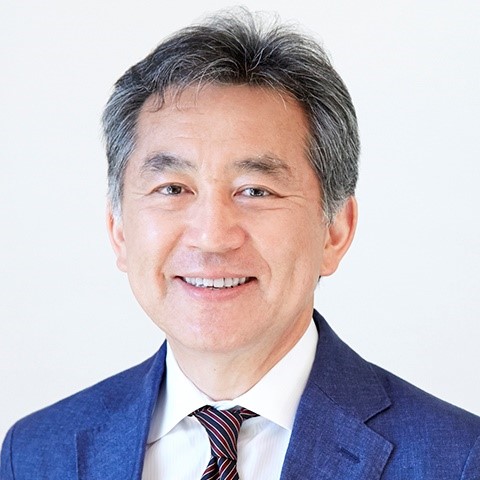
Hisashi Yoshikawa
Hisashi Yoshikawa, University of Tokyo, JapanMr Hisashi Yoshikawa is a Project Professor at the Graduate School of Public Policy, University of Tokyo, and is affiliated with the Policy Alternatives Research Institute. Prior to joining the university in September 2011, he held positions at prominent organizations. He served as Senior Advisor for Long-Term Policy at the International Energy Agency (IEA) and as Deputy Director of the Directorate of Science, Technology and Industry (STI) at the Organisation for Economic Co-operation and Development (OECD). Additionally, he gained experience working in the Ministry of Economy, Trade and Industry (METI) of the Japanese Government, where he held directorial roles including Director of the Service Affairs Policy Division and Director of the Petroleum Distribution Division. Mr. Yoshikawa’s expertise lies in policy planning and implementation, with a focus on the energy sector. He obtained a master’s degree from the John F. Kennedy School of Government, Harvard University, in 1987 and a bachelor’s degree in law from the University of Tokyo in 1981. Currently, he also serves as an Advisor for the Sasakawa Peace Foundation (SPF) and a Senior Research Fellow at the Canon Institute for Global Strategy (CIGS).
Special issues
Papers submitted to the conference have the opportunity to publish in one of the special issues. Qualified papers will be invited to submit to the suitable journal based on recommendations by the guest editors and editors.
Please note that the recommendation does not guarantee final publication, all regular requirements by journals have to be satisfied.
1. Energy Economics (SSCI, JCR 1, ABS 3, ABDC A*)
Topic: Exploring the climate impacts on energy markets: new insights on energy risk management
- Submission closed: 10 September, 2023
- Publication of the special issue: Dec. 2023
Guest editors:
Prof. Qiang Ji
Institutes of Science and Development, Chinese Academy of Sciences, China
jqwxnjq@163.com
Professor Duc Khuong Nguyen
IPAG Business School, France.
duc.nguyen@ipag.fr
Prof. Shunsuke Managi
Urban Institute, Kyushu University, JAPAN
managi@doc.kyushu-u.ac.jp
Professor Dayong Zhang
Research Institute of Economics and Management, Southwestern University of Finance and Economics, China
zhangdayong@gmail.com
2. Applied Energy (SCI, JCR 1)
Topic: Policy dilemmas and solutions to the successful energy transition
- First submission date: 31st May 2023
- Final submission deadline: 1st December 2023
Guest editors:
Prof. Shunsuke Managi
Urban Institute, Kyushu University, JAPAN
managi@doc.kyushu-u.ac.jp
Prof. Qiang Ji
Institutes of Science and Development, Chinese Academy of Sciences, China
jqwxnjq@163.com
Prof. Xunpeng Shi
Australia-China Relations Institute, University of Technology Sydney, Australia
Xunpeng.shi@uts.edu.au
Prof. Dayong Zhang
Research Institute of Economics and Management, Southwestern University of Finance and Economics, China
zhangdayong@gmail.com
Prof. Wolfgang Eichhammer
Competence Center Energy Policy and Energy Markets, Fraunhofer Institute for Systems and Innovations Research, Germany
wolfgang.eichhammer@isi.fraunhofer.de
3. Journal of Climate Finance
Topic: New Trends in Climate Finance under the Carbon Neutrality Target
When submitting your manuscript please select the article type ‘VSI: Trend in Climate Finance’. Please submit your manuscript before 30th Aug 2023.
Guest editors:
Professor. Yue-Jun Zhang
Business School, Hunan University, Changsha, China
Professor. David Dickinson
Birmingham Business School, University of Birmingham, Birmingham, UK
Professor. Yudong Wang
School of Economics and Management, Nanjing University of Science and Technology, Nanjing, China
Dr. Fei Wu
Research Institute of Economics and Management, Southwestern University of Finance and Economics, Chengdu, China
4.Utilities Policy
Topic: Policies to Advance Investment in Sustainable Energy Utilities
Guest Editors
Assoc. Prof. Farhad Taghizadeh-Hesary, PhD;
Tokai University School of Global Studies, Tokyo, Japan
Assoc. Prof.Rabindra Nepal, PhD
University of Wollongong School of Business, Wollongong, Australia
Prof. Bing Xu, PhD
Heriot-Watt University Edinburg Business School, UK
Prof Emeritus. Naoyuki Yoshino, PhD
Keio University School of Economics, Tokyo, Japan
Submission deadline: 1 Mar 2024.
5. Chinese Journal of Population, Resources and Environment (ESCI)
Topic: Efficiency and Cost Issues towards Clean Energy Transition
Guest Editors
Xunpeng (Roc) SHI
Research Principal/Professor, Australia-China Relations Institute, University of Technology Sydney (UTS)
Email: xunpeng.shi@uts.edu.au
Chin-Hsien YU
Professor, School of Public Administration, Southwestern University of Finance and Economics, Chengdu, China
Email: evaniayu@gmail.com; chinhsienyu@swufe.edu.cn
Jinxiu DING
Assistant Professor, Department of Public Finance, School of Economics, and Wang Yanan Institute for Studies in Economics, Xiamen University, Xiamen, China
Email: jinxiuding@xmu.edu.cn
Gagan Deep SHARMA
Professor, University School of Management Studies, Guru Gobind Singh Indraprastha University, New Delhi, India
Email: angrishgagan@gmail.com, gagan@ipu.ac.in
Submission start date: 1 June 2023
Submission deadline: 31 December 2023
6. Frontiers in Environmental Science (IF: 5.411, JCR: Q2)
Submissions to this Topic Collection are also welcome via Frontiers in Earth Science (IF: 3.661, JCR: Q2), Frontiers in Ecology and Evolution (IF: 4.493, JCR: Q2) and Frontiers in Energy Research (IF: 3.858, JCR: Q3).
- Submission Deadline 30 November 2023
Guest Editors
Hang Seng University of Hong Kong
Research Principal/Professor, Australia-China Relations Institute, University of Technology Sydney (UTS)
Email: xunpeng.shi@uts.edu.au
7.Economic Change and Restructuring
- Topic: Energy Transition and Sustainable Economy
Guest Editors:
Farhad Taghizadeh-Hesary (farhad@tsc.u-tokai.ac.jp) Tokai University, Japan
More information in bellow link:
Important dates:
- Abstract submission deadline: 31 May 2023
- Notification of Acceptance: 15 June 2023
- Early bird registration: 30 June 2022
- Registration deadline: 31 July 2023
- Conference: 14-19 October 2023
ISETS-ESCAP Energy Transition Forum, 16-17 October
Participation in the ISETS-ESCAP Energy Transition Summit, which will take place at the UN Conference Center on October 16th-17th, 2023, is free of charge.
Registration details will be announced in due course.
Concurrent Sessions, 18-19 October*:
Participation in the remaining events of the Annual Conference will require payment of a registration fee by 31 July 2023 as follows:
Scholar: 800 AUD
Students: 500 AUD
*Early bird registration (by 30 June 2023) will have a discount of 100 AUD.
(1) REGISTRATION FEES are payable in advance, no onsite registration is allowed.
(2) To include the paper in the conference program and the conference proceedings, at least one of the authors has to register before the registration deadline. If multiple submissions are accepted, then a different author will be required to pay the registration fee and present each paper. Otherwise, authors will be contacted and asked to drop one or more paper(s) for presentation.
(3) Full time students (not including post doctor) MUST provide proof of status (copy of valid student ID card or letter from affiliated institution head or program director).
(4) Fees are paid online. In the rare case, payment can be arranged by Bank Transfer
Bank: National Australia Bank
BSB (bank, state, branch): 082-356
BIC/SWIFT code: NATAAU3303M
Account number: 406628981
Beneficiary name and address: International Society for Energy Transition Studies, 5 Barraba Place, Bella Vista, NSW 2153, Australia
Please quote the attendee nam as the Remittance Information when making a bank transfer payment.
Please Login in the system by your account and fill in the registration form and upload the photographed or scanned copy of the remittance.
Cancellations Policy
No refund can be made from the original registration fee once the registration fee is confirmed. There are no exceptions to this policy. Should you be unable to attend, however, a substitution may be made to transfer your fully paid registration to another member of your organization at any time up to August 31, 2023.
Submissions [Please use the templates]
Individual participants
To submit your abstract, please follow these instructions:
- Click on “Registering Now” on this conference website. If you receive a message that says “You have already booked this event“, it means that you have registered before. You can follow the link to “My Events”.
- Alternatively, log in to your member portal. If you are new, you need to register. If you forget your password, please reset it. Your username is the one you chose during registration. You can also use your email address as your username. Please note that if you registered before May 1, 2023, you will need to reset your password. A default password was provided in the ISETS Newsletter for Q2 2023.
- Click on “MY EVENTS” as shown below.

4. You will find the conference there, and you need to submit your abstract from there. Please also attached a long abstract with the following template. Template_Abstract
5. Once your abstract is accepted, the organizers will inform you of further steps.
6. You will also need to manage your payment from “MY EVENTS”.
Session Organisers
Proposals to organize Sessions should include the following information:
- The title of the Session
- The name, affiliation, mailing address and e-mail address(es) of the proposer(s)
- A description of the topic of the Session (not exceeding 100 words)
- A short description of the means of advertisement for the Session
The deadline for proposal submission is 15 June 2023. Please send your proposal (Template_Session Proposal) to isets@isets.org; dzhang@swufe.edu.cn.
Location
Bangkok, officially known in Thai as Krung Thep Maha Nakhon and colloquially as Krung Thep, is the capital and most populous city of Thailand. The city occupies 1,568.7 square kilometres (605.7 sq mi) in the Chao Phraya River delta in central Thailand and has an estimated population of 10.539 million as of 2020, 15.3 percent of the country’s population. Over 14 million people (22.2 percent) lived within the surrounding Bangkok Metropolitan Region at the 2010 census, making Bangkok an extreme primate city, dwarfing Thailand’s other urban centres in both size and importance to the national economy.
Climate
Like most of Thailand, Bangkok has a tropical savanna climate (Aw) under the Köppen climate classification and is under the influence of the South Asian monsoon system. October in Thailand is influenced by Tropical Wet & Dry climate. Please expect usually rain, repeatedly thunderstorm and warm weather. The temperatures will be between 25-32 degrees Celsius (77-89 degrees Fahrenheit). Light tropical clothing would be appropriate. The conference and meeting rooms at the UNCC are air-conditioned and the temperature is maintained in the range of 23-24 degrees Celsius (73-75 degrees Fahrenheit).
Tourism
Bangkok is one of the world’s top tourist destinations. Of 162 cities worldwide, MasterCard ranked Bangkok as the top destination city by international visitor arrivals in its Global Destination Cities Index 2018, ahead of London, with just over 20 million overnight visitors in 2017. This was a repeat of its 2017 ranking (for 2016). Euromonitor International ranked Bangkok fourth in its Top City Destinations Ranking for 2016. Bangkok was also named “World’s Best City” by Travel + Leisure magazine’s survey of its readers for four consecutive years, from 2010 to 2013. As the main gateway through which visitors arrive in Thailand, Bangkok is visited by the majority of international tourists to the country. Domestic tourism is also prominent. The Department of Tourism recorded 26,861,095 Thai and 11,361,808 foreign visitors to Bangkok in 2010. Lodgings were made by 15,031,244 guests, who occupied 49.9 percent of the city’s 86,687 hotel rooms. Bangkok also topped the list as the world’s most popular tourist destinations in 2017 rankings.
VISA AND IMMIGRATION REQUIREMENTS
Participants must obtain an appropriate entry visa prior to enter Thailand from the Royal Thai Embassy or the Royal Thai Consulate-General before travel, EXCEPT for those nationals listed in this link MFA list of Visa Exemption and VOA.
To apply for an appropriate entry visa to Thailand, please contact the nearest Royal Thai Embassy or Consulate-General for the most updated information regarding visa application procedures and required documents. The list of Royal Thai Embassy/Consulate-General can be found at https://www.thaiembassy.org/
Electricity
The electricity voltage in Bangkok is 220V, 50Hz. Please note that plug adapters may be necessary. the plug types used are either Type A, Type B, or Type C. A hybrid socket is almost universally found, which accepts a combination of the above plug types.

Delegates are strongly encouraged to carry their own adapters for use with laptops and other electrical appliances as the Secretariat will not be able to provide these. In case of need, adapters can be purchased from shops in the city dealing in electronic and electrical items.
Transport from and to Airport
The locations of the UNCC venue, the Pullman Bangkok King Power hotel and two airports are as follows:
Add locations to your google maps: https://goo.gl/maps/KHWddHc7kRxMg69f7
Participants should make their own transportation arrangements from Suvarnabhumi International Airport (BKK) or Don Mueang International Airport (DMK) to their respective hotels.
Public transportation
For those arriving at Don Mueang Airport, a taxi or Grab taxi would be the most efficient choice to reach your hotel comfortably.
For travelers arriving at Suvarnabhumi International Airport, the most convenient way to reach the hotel would be to take the Airport Link to Phayathai Station. From Suvarnabhumi International Airport, there is an Airport Rail Link, an express and commuter rail connecting to Makkasan Station (MRT subway Petchaburi Station) and Phayathai Station (BTS Skytrain), passengers should go to Level B. Detailed information can be found at https://www.srtet.co.th/index.php/en/
Upon arrival at Phayathai Station (the last stop of the Airport Link Express), you can easily find Exit 4, which will lead you to the conference hotel. The distance is just a short 10-minute walk. Alternatively, if you prefer a quicker option, you can consider taking a motorbike taxi or a Grab taxi.
Transportation route
Between Pullman and UNCC
Returned bus transporation will be provided between Pullman Hotel and UNCC will be provided on 16 and 17 October.
Aprirts and Pullman Hotel
FROM Don Mueang International Airport (DMK) TO Pullman Bangkok King Power Hotel
FROM Suvarnabhumi Airport (BKK) TO Pullman Bangkok King Power Hotel

Electric taxis
Electric taxis (EVsociety/VIP) are currently available at the Suvarnabhumi International Airport (DMK). The counter is located next to the main taxi area. The service is available 24 hours and can be pre-booked via:
Line ID: @evsociety
Phone: +66 2039 8888
Email: taxivip@evsociety.co.th
Facebook: EV Society
Grab, Bolt and MuvMi
Grab is the most recommended taxi app just like Uber (which is not available in Thailand), it doesn’t make any detours, it doesn’t shout out the price randomly, it’s transparent in terms of the price and easy to find a car, and it has the best coverage of the whole of Thailand. Bolt is generally cheaper version of Grab (from half to 1/4 cheaper), and MuvMi is an electric tuk-tuk service at a fair price. Tuk-tuks tend to be more of a short distance service, so at the moment they are only available in one area (you can’t take a tuk-tuk across districts at the moment).
Limousine Service:
Transfer to/from Hotel to Airport: THB 1,850.- net per car per way (Toyota Camry with maximum 2 persons with luggage)
Please book the service from the Hotel.
Alternative accommodation
You can also book any of the other five ESCAP cooperate hotels:
| Centra Phra Nakorn | Name: Ms. Porntip Seekhiaw
Telephone: +66 (0) 2 022 6336 Email: porntipse@chr.co.th website: https://www.centarahotelsresorts.com/centra/cbp |
| Royal Princess | Name: Ms. Bussara Luilao
Telephone:+ 66 (0) 2281 3088 Email: bussara@royalprincesslarnluang.com Website: www.royalprincesslarnluang.com |
| The Sukosol | Name: Ms. Ratchanikrit Khankath
Telephone: + 66 (0) 2247 0123 Email: tsb.ados@sukosolhotels.com Website: www.sukosolhotels.com |
| Amari Watergate | Name: Ms. Merin Leetikul
Telephone: + 66 (0) 2653 9000 Email: merin.l@amari.com Website: www.amari.com |
| Novotel Bangkok Platinum
Pratunam |
Name: Ms. Ployrawee Sukploypan
Telephone: +66 (0) 2 209 1700 Email: H7272-SL2@accor.com Website: Novotelbangkokplatinum.com |
If you would like to book these cooperate hotels, please contact the contact person for each hotel, and tell the contact person that you will attend ESCAP Asia Pacific Energy Week, then you can automatically enjoy the agreed hotel rates.
Others
- Time Zone: Bangkok, Thailand is GMT+7
- Emergency Services Telephone Numbers:
- Emergency Call / Police
- Tourist Police
1669 Ambulance Service Center
- Suvarnabhumi Airport Call Center
02-288-1100 United Nations’ Emergency
- Metered-taxi and bus services are readily available at the airport. More information is available at https://www.bangkokairportonline.com
- To use the airport limousine service, it is strongly recommended that participants contact only the authorized officials at the counters located in the airport arrival zone. These officials will issue a ticket for the assignment of a limousine for transporting passengers to the desired destination, upon request. The Suvarnabhumi International Airport limousine service counters are located on Level 2 at Baggage Claim and Arrival Hall exits, channels A, B and C.
- For public taxis, participants are advised to proceed to the Level 1 of the Passenger Terminal, between exit doors 4 and 7, outdoor area, where they will find automatic dispensing machines from which they can collect a queuing ticket for a public taxi. In addition to toll fees, there is a THB 50 surcharge to be added to the meter charge from the airport to the city. Please refer to the airport website noted above for details.
FOREIGN EXCHANGE & BANKING SERVICE
Currency exchange facilities are available at the airport, hotels, department stores and many locations. The UN Conference Centre also provides with the Siam Commercial Bank, United Nations Branch, located on the first floor of the Service Building. It is open from 09:00 to 15:30 hours, with no lunch break, from Monday to Friday.
As of August 29, 2023, 1 US Dollar equals to 35.28 Thai Baht as per Google search result.
Airline reservations
Participants are advised to secure their return bookings prior to their departure for Bangkok. If this is not possible, they should make firm return bookings immediately upon arrival in Bangkok.
Travel services are available through the American Express Global Business Travel (AMEX-GBT) office located on Level 1, UNCC and is open weekdays from 08:00 to 17:00 hours, Tuesday through Thursday. Remote support is available on other days (escap_amextravel@un.org)
Please remember that there are two airports in Bangkok, the exact locations are listed in the map above.
Postal services
The United Nations branch of Thailand Post is on the ground floor of UNCC. It is open from 0800 to 1600 hours, Monday through Friday. The Post Office can be contacted at extensions 1260 and 2114.
Safety and Security
For security and safety reasons, participants are reminded NOT to leave their belongings unattended. Belongings left unattended within the UNCC may be removed to the nearest Lost and Found counter or the Security Operations Centre.
All occupants of the UNCC. MUST comply at all times with all lawful directions given by the officers of the United Nations Security and Safety Section. Failure to do so may lead to the participant’s removal from the UNCC.
Contact numbers:
Sender email:
no-reply@isets.site; isets23un@163.com; isets@isets.org
[Please add those email to your list of trusted domains.]Inquiry emails:
Email: isets@isets.org
[Please add @isets.org to your list of trusted domains.]Invitation Letter for Partnership & Exhibition
Dear Institutional Partners,
The International Society for Energy Transition Studies (ISETS) cordially invites institutions and organisations to participate in the Inaugural ISETS International Conference on October 14th-19th, 2023. Specifically, we would like to extend an invitation for you to join us as a partner in the exhibition for the Global Energy Transition Dialogue to be held at the United Nations Conference Centre, Bangkok on October 16th-17th.
The annual conference will address a broad spectrum of energy, climate change, and other environmental topics, and will feature keynote and plenary sessions with dialogues among ministers and senior officials from ESCAP member States, as well as prominent figures from the industry, think tanks, NGOs, multilateral organizations, and the academic community.
The Dialogue is a collection of the annual conference’s plenary sessions and is co-organized with the United Nations Economic and Social Commission for Asia and the Pacific (ESCAP), in partnership with several renowned institutes from around the world. These plenary sessions are open to the public free of charge. The dialogue/plenary sessions and the Third Asian and Pacific (Ministerial) Energy Forum (APEF3) on October 18th-20th 2023 are important components of the Asia Pacific Energy Week. The key findings and recommendations from the dialogue/ plenary Sessions will contribute to APEF3. (For details, please refer to https://www.unescap.org/events/2023/APEF3).
As a Conference Partner, you will have access to exclusive branding opportunities, global reach on ISETS/ESCAP’s international network, and the chance to support sustainable development goals in the Asia-Pacific region. Your brand will be amplified among an esteemed regional audience of over 250 senior officials, scholars, and industrial experts and you will have the opportunity to network with distinguished officials, thought leaders, and leading scholars from around the world.
Institutions and organisations also have opportunities to be partners for other functions of the annual conference.
Limited positions are available! Act now for the best chance to secure your spot! For inquiries, please contact isets@isets.org.
We also welcome you to join ISETS—an open, public-owned platform for public benefits. Details are available at: www.isets.org.
Prof Xunpeng Shi, PhD
Conference Co-Chair & President of Executive Committee, ISETS
May 2023
Details of the hotel
Firstly, we are pleased to announce that the Pullman Bangkok King Power Hotel has been selected as the official conference hotel. Please see attached Pullman Bangkok King Power information sheet for more details:
Click here to see details for the Pullman Bangkok King Power Hotel
Ms. Wareepohn (Ally) is the account manager who will be the primary point of contact to assist you with accommodation and any further requirements. Please process for direct booking before the Cut-off date (05 October 2023) through the link below:
https://www.idem.events/r/international-conference-for-science-educators-and-teachers-iset-c6d66d1c
You can also book any of the other five ESCAP cooperate hotels (Details are available at the Attachement):
| Centra Phra Nakorn | Name: Ms. Porntip Seekhiaw
Telephone: +66 (0) 2 022 6336 Email: porntipse@chr.co.th website: https://www.centarahotelsresorts.com/centra/cbp |
| Royal Princess | Name: Ms. Bussara Luilao
Telephone:+ 66 (0) 2281 3088 Email: bussara@royalprincesslarnluang.com Website: www.royalprincesslarnluang.com |
| The Sukosol | Name: Ms. Ratchanikrit Khankath
Telephone: + 66 (0) 2247 0123 Email: tsb.ados@sukosolhotels.com Website: www.sukosolhotels.com |
| Amari Watergate | Name: Ms. Merin Leetikul
Telephone: + 66 (0) 2653 9000 Email: merin.l@amari.com Website: www.amari.com |
| Novotel Bangkok Platinum
Pratunam |
Name: Ms. Ployrawee Sukploypan
Telephone: +66 (0) 2 209 1700 Email: H7272-SL2@accor.com Website: Novotelbangkokplatinum.com |
If you would like to book these cooperate hotels, please contact the contact person for each hotel, and tell the contact person that you will attend ESCAP Asia Pacific Energy Week, then you can automatically enjoy the agreed hotel rates.
The comparison of the different hotels is attached below, including special discounts by hotels to ESCAP, travel, transportation and Visa sub-unit:
